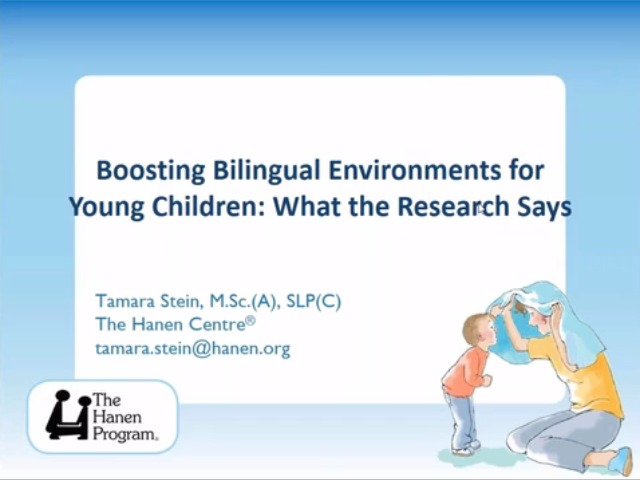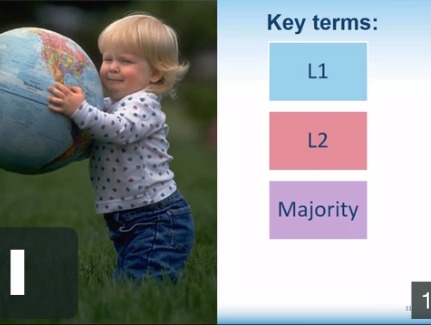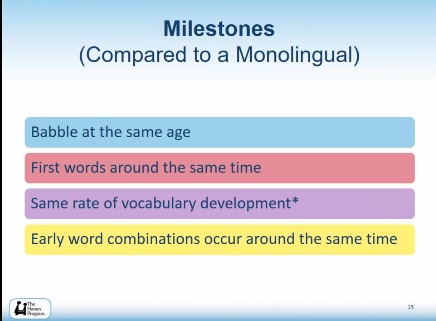When I was in school, we did not talk a lot about bilingualism beyond assessing articulation and the importance of language differences vs. language disorders. When I was in school, I was told that if you had a child who was language delayed in a bilingual home, the parents should pick one primary language. There has been a lot of research since then, so I was excited when I was contacted by the Hanen Centre to review their newest CEU on Bilingualism.
Disclosure Statements: I received access to this e-seminar for free for the purpose of a review. The views expressed are my own. I am not receiving any other financial compensation for this review.
 I first learned about the Hanen program when I was in grad school. The Hanen Centre is located in Canada. They focus on helping parents and other caregivers learn how to support children’s language, literacy and social skills throughout every day activities.
I first learned about the Hanen program when I was in grad school. The Hanen Centre is located in Canada. They focus on helping parents and other caregivers learn how to support children’s language, literacy and social skills throughout every day activities.
If you work with in early intervention or have close contact with the families you serve, I highly recommend their products and training. I was lucky enough to attend an It Takes Two seminar and have maintained my certification with Hanen since then.
Bilingual E-Seminar Technical Report
Let’s talk about some technical issues first. The audio is clear and the speaker is well spoken. The slide deck presentation was well designed and the speaker was able to provide new information vs. just reading the slides. This was first presented as a live seminar-so there are a few times when the speaker will direct people to go to another site to watch a video and then return to the presentation. The video will play on the replay and I did not find it too distracting that this wasn’t edited out of the final product. It was easy to log into my account and watch the seminar.
Bilingual E-Seminar Contents
As I said before, I have not taken a lot of seminars or coursework related to supporting bilingual learners. What I liked about this seminar was that it was research based and gave practical ideas of how to support bilingual families and their children. I learned about some new terms to make my reports more professional including use of L1 (first language), L2 (second language) and the majority language (the language which is spoken most often at home.)

The seminar contains the following information:
- Definitions of bilingualism
- Typical Bilingual Development
- Identifying language delays within bilingual children
- Strategies for supporting bilingual children and their families.
- Case studies and videos

The speaker provides information on the research and practical ideas of how to use that to plan therapy sessions or to talk to families about the research to help support them in their decisions at home. I enjoyed the video examples and case studies. These helped me to practice the information presented immediately. One of the last videos, was a great example of focused language stimulation targeting “empty” and reinforced my belief that we need to teach children the concepts rather than just drilling the concepts in speech therapy.
Bottomline:
I would recommend most of the Hanen e-seminars. I think that they provide valuable information and are organized well for learning online. This course focuses primarily on working with families and early intervention, so keep that in mind if you are supporting later elementary to middle school clients. I learned a lot and there were definitely things that I didn’t know from the research as well as some practical ideas that I can use at home.
Want to learn more? The Hanen Centre has some great articles and resources for you to share with families.
- Helping Children Learn English as a Second Language
- Can children with language impairments learn two languages?
- Bilingualism in Young Children: Separating Fact from Fiction
Boosting Bilingual Environments for Young Learners
- Non-Members 84.95
- Members 45.00
There are also discounts for group registration is you were to present this at a district meeting.
Use the Discount Code SPEECH2U40 to receive 40% off the registration of the On-Demand e-Seminar Boosting Bilingual Environments for Young Children: What the Research Says (0.2 ASHA CEUs).
Discount expires November 30th, 2016.
Question: Do you have students or clients who are bilingual? What strategies do you use to support them?

